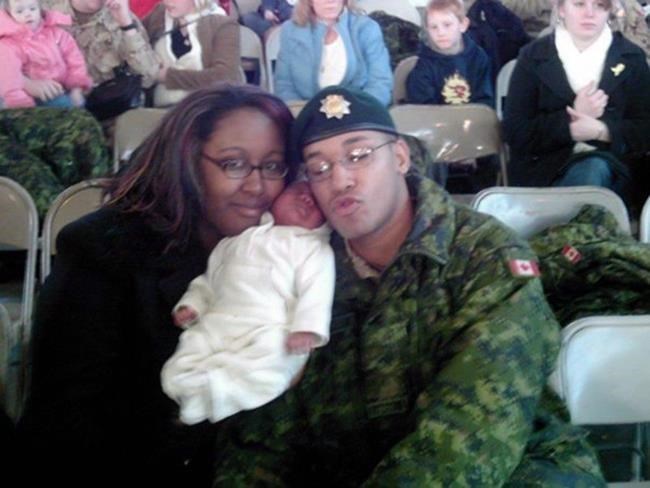PORT HAWKESBURY, N.S. — A lack of collaboration among health-care professionals was an "overwhelming theme" in the tragic case of an ex-soldier from Nova Scotia who killed three family members and himself in 2017, a provincial fatality inquiry heard Thursday.
Dr. Peter Jaffe, a psychologist at Western University in London, Ont., told the inquiry there was evidence showing psychiatrists, psychologists, social workers and others failed to share critical information about Lionel Desmond's steady mental decline after he was released from the military in June 2015.
Desmond, 33, bought a Soviet-era SKS 7.62 semi-automatic carbine on Jan. 3, 2017, and fatally shot his 52-year-old mother Brenda, his 31-year-old wife Shanna and their 10-year-old daughter Aaliya inside the family's home in Upper Big Tracadie, N.S.
"Throughout the file, I see a theme that we see in our death review cases in Ontario, which is a lack of collaboration — people working in silos, not sharing information, not getting together," said Jaffe, a co-founder of the Centre for Research and Education on Violence Against Women and Children.
An absence of collaboration is a theme that has surfaced several times during the inquiry, which started hearings in January 2020 and has heard 49 days of testimony. It is expected to draw to a close before the end of this year.
On Wednesday, Jaffe said the Afghanistan war veteran had contact with 40 mental-health professionals from the time he was diagnosed with post-traumatic stress disorder and major depression while still serving in the military in 2011 until his final days in 2017.
"In my view, there's no reason why prior service providers couldn't have written a summary and forwarded it and offered their email address and cellphone number for followup," he told the inquiry Thursday. "There's lots of ways information could have been shared."
The psychologist recalled that Desmond and his wife Shanna were desperately seeking help from local health facilities in eastern Nova Scotia in the fall of 2016 when a psychiatrist at St. Martha's Regional Hospital in Antigonish decided to take Desmond as a patient.
Though Dr. Ian Slayter quickly realized Desmond was in dire need of help, he was unable to get the federal medical records he needed for a proper assessment.
"All of the information was potentially there, but not available to him for a number of reasons, which are the subject of this fatality inquiry," Jaffe said Thursday.
Warren Zimmer, the provincial court judge presiding over the inquiry, said that on Oct. 11, 2016, Desmond had asked Veterans Affairs Canada for a discharge summary drafted after he attended a residential treatment program at Ste. Anne's Hospital in Montreal. But he still didn't have the document by the time he arrived at St. Martha's on Oct. 24, 2016.
With access to that document, Jaffe said, "Dr. Slayter would have been in a much better position to understand the depth of the issue and the need for immediate planning."
In a report submitted to the inquiry, Jaffe said Desmond's interactions with Slayter were "limited by the lack of access to all the prior assessments" and attempts at intervention.
On Wednesday, Jaffe told the inquiry most of the professionals Desmond dealt with had focused on his potential for suicide and overlooked or ignored multiple warning signs indicating he was at high risk of killing his wife and family.
Jaffe submitted eight recommendations to the inquiry, including a call for expanded education on domestic violence for front-line professionals.
He also recommended the Canadian Armed Forces and Veterans Affairs Canada should ensure that high-risk cases are flagged for immediate followup and properly shared with community partners.
Other recommendations included establishing a domestic violence death review committee in Nova Scotia and improving the use of police risk assessment tools.
This report by The Canadian Press was first published Nov. 4, 2021.
— By Michael MacDonald in Halifax
The Canadian Press



